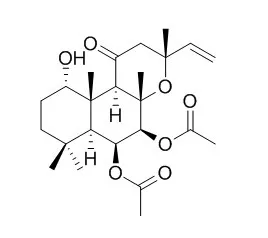| Cell Research: |
| Molecular Pharmacology, 1992, 40(6):960-964. | | Reversal of doxorubicin resistance by hydrophobic, but not hydrophilic, forskolins.[Reference: WebLink] |
The plant diterpene forskolin reverses acquired resistance to doxorubicin in variants of the murine sarcoma S180 cell line.
METHODS AND RESULTS:
Because forskolin is known to elevate intracellular cAMP levels, investigations were performed to determine whether this reversal of resistance resulted from effects on signal transduction. Two analogues of forskolin(Forskolin G), dideoxyforskolin, which does not elevate cAMP, and a water-soluble analogue, were also investigated. Although all three diterpenes elevated levels of either cAMP or protein kinase C, these effects were not consistently associated with reversal of doxorubicin resistance. Likewise, all three diterpenes were capable of displacing [3H]azidopine from P-glycoprotein, but reversal of doxorubicin resistance was observed only with forskolin and dideoxyforskolin, suggesting that binding to P-glycoprotein may be a necessary, but not sufficient, condition for reversing doxorubicin resistance.
CONCLUSIONS:
The hydrophobicity of the compounds appeared to be the single factor most consistently related to reversal of doxorubicin resistance in this cell system, with the hydrophilic compound water-soluble forskolin failing to produce this result, even at concentrations 10-fold higher than effective concentrations of the hydrophobic diterpenes. |
|






 Cell. 2018 Jan 11;172(1-2):249-261.e12. doi: 10.1016/j.cell.2017.12.019.IF=36.216(2019)
Cell. 2018 Jan 11;172(1-2):249-261.e12. doi: 10.1016/j.cell.2017.12.019.IF=36.216(2019) Cell Metab. 2020 Mar 3;31(3):534-548.e5. doi: 10.1016/j.cmet.2020.01.002.IF=22.415(2019)
Cell Metab. 2020 Mar 3;31(3):534-548.e5. doi: 10.1016/j.cmet.2020.01.002.IF=22.415(2019) Mol Cell. 2017 Nov 16;68(4):673-685.e6. doi: 10.1016/j.molcel.2017.10.022.IF=14.548(2019)
Mol Cell. 2017 Nov 16;68(4):673-685.e6. doi: 10.1016/j.molcel.2017.10.022.IF=14.548(2019)